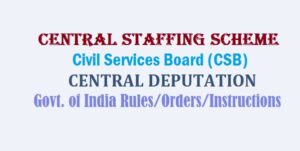GS II-GOVERNANCE

The Central Staffing Scheme (CSS) is a mechanism for selecting and appointing officers from All India Services (AIS) and Group ‘A’ Central Services to various senior positions in the Central Government on deputation. The scheme ensures a structured and transparent process for staffing key positions in ministries, departments, and autonomous bodies under the Government of India.
Objectives of the Central Staffing Scheme (CSS)
- Ensuring Efficient Administration – Select officers with experience and expertise for key policymaking and implementation roles.
- Inter-Service Coordination – Facilitate exchange and integration of officers from different services in the central administration.
- Merit-Based Appointments – Ensure fair selection of officers based on performance, experience, and suitability.
- Strengthening Centre-State Relations – Encourage officers from state cadres to serve at the central level and gain broader governance exposure.
- Skill Development – Provide officers with central-level experience, enabling them to take up leadership roles in state and central administration later.
Key Features of the Central Staffing Scheme (CSS)
| Feature | Description |
| Applicability | Applies to officers from All India Services (IAS, IPS, IFoS) and Group ‘A’ Central Services. |
| Type of Appointment | Deputation-based appointments in ministries, departments, autonomous bodies, and regulatory institutions. |
| Duration of Deputation | Typically 5 years (can be extended to 7 years in certain cases). |
| Selection Authority | Department of Personnel and Training (DoPT) under the Ministry of Personnel, Public Grievances, and Pensions. |
| Selection Process | Officers are nominated by the state cadre authorities and selected through the Civil Services Board (CSB). |
| Eligibility Criteria | Officers must have completed a minimum period of service in their respective cadres. |
| Deputation to International Organizations | Officers can also be sent to United Nations (UN), World Bank, IMF, and other international bodies. |
| Repatriation | After deputation, officers return to their parent cadre/state with additional administrative experience. |
Selection Process Under CSS
- Nomination: State and central cadre authorities nominate officers willing to serve under CSS.
- Screening: The Empanelment Committee reviews the nominations and shortlists officers based on their past performance, experience, and integrity.
- Approval by the Appointments Committee of the Cabinet (ACC): The final selection is made by the ACC, chaired by the Prime Minister.
- Appointment: Officers are placed in central ministries, regulatory bodies, PSUs, or international organizations for deputation.
Posts Filled Under the Central Staffing Scheme (CSS)
- Secretaries (to Government of India)
- Additional Secretaries & Joint Secretaries
- Director and Deputy Secretary-level officers
- Heads of Regulatory Bodies (like TRAI, SEBI, CCI, etc.)
- Chief Vigilance Officers (CVOs) in PSUs and autonomous bodies
- Senior positions in International Organizations (UN, World Bank, IMF, WTO, etc.)
Criticism & Challenges in CSS
- Cadre Imbalance: Some states complain about losing experienced officers to central deputation, affecting state administration.
- Bureaucratic Delays: Selection and appointment processes can be lengthy and opaque.
- Lack of Incentives: Some officers are reluctant to opt for central deputation due to fewer monetary benefits and slower career progression.
- Political Interference: Concerns about political favoritism in appointments and postings.
- Repatriation Issues: Officers sometimes face challenges reintegrating into their parent cadres after central deputation.
Reforms & Way Forward
- Greater Transparency: Ensuring a merit-based selection process with minimal political influence.
- Better Career Incentives: Offering better perks, promotions, and facilities to attract more officers.
- Balanced Cadre Strength: Ensuring that state governments are not left understaffed due to central deputation.
- Improved Monitoring: Strengthening mechanisms for performance evaluation and accountability of officers on central deputation.




